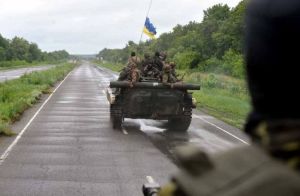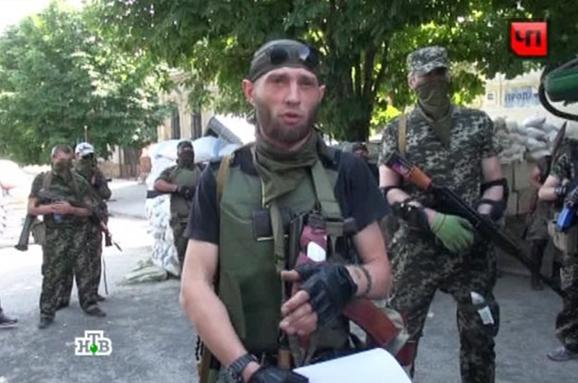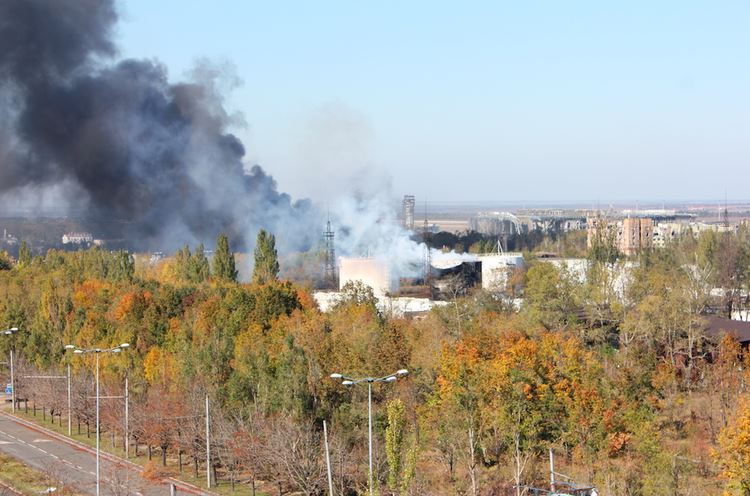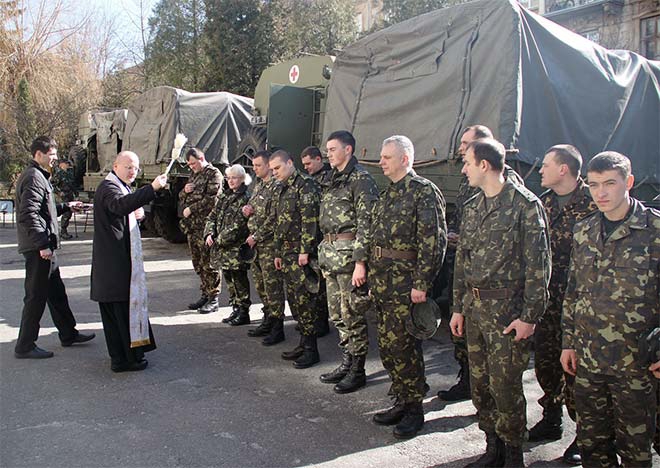A siren has been howling since the very morning in Donetsk. It’s the ambulances rushing to help. Sometimes we can hear gunshots, sometimes shells exploding.
It is now that the “voice of Donbas” is loud and prosaic. Other voices are almost indistinguishable: the Donetsk citizens have learned to whisper.
The antiterrorist operation resumed here a week ago. And while they only shot near the airport before, now bullets are whizzing in several suburban districts simultaneously. In some places, electrical stations and parts of the gas pipeline have been rendered unusable due to military action, and 15 thousand people were left without electricity.
Everything is peaceful in the city center so far, but there are practically no people in the streets.
“I woke up with a start this morning because they started shooting in my yard,” tells journalist Dmytro Shybalov. “The men sat down there to drink on the bench as per usual, and suddenly the guys from the PRD emerged – it seemed they conducted an emergency ‘mobilization.’ They started yelling at the men, that it’s not allowed to drink, they started shooting, in the end they made them all line up in front of the playground, some were taken home, and some were taken to the construction battalion to dig trenches.”
There are many such stories shared among the Donetsk people now. The PRD-ers have set up mine launchers in some yards, or became neighbors for some people. Nobody is surprised to see men with rifles in cafes, where they frequently come to have dinner.
The lives of the city folk is now closely intertwined with the lives of the mercenaries.
“I have this uncomfortable feeling… I was walking down the street, a granny stopped me and asked for money to buy drops for a small child,” tells local businessman Dmytro Kolesnikov. “I went to the pharmacy and bought the medicine for her myself. And for some reason she said: ‘Thank you, because my son has been in the rebellion for two months now and is now lying wounded, we have no money at all.’ It is best for me not to have known…”
Despite the fact that ATO troops are approaching the city, few Donetsk citizens are ready to leave their homes. Every citizen is considering it, of course, but not everyone would brave leaving. Many consider staying in Donetsk a matter of principle.
“I think that a patriotism of a special level has emerged in Donetsk,”
thinks young businessman and civic activist Enrique Menendez. “It is the intermediary stage between love of oneself and love of the country – love of the region.”
“Yes, here it has been artificially cultivated to some extent, because we are used to being proud of being from Donbas. However, in times of peace, I developed my business and thought that I was creating new jobs for my region and paying taxes. And now I have other tasks, unfortunately, but I feel completely at peace with it.”
Enrique is one of the participants of the Donetsk initiative group which established humanitarian aid supplies for refugees to Sviatohorsk, he participates in the talks process regarding release of hostages and the evacuation of the elderly and children from the military action zone.
He calls himself a “local patriot” and takes offense to some extent that the majority of Ukrainians consider citizens of Donbas an “uneducated mass.”
“Ukraine’s perception of Donetsk citizens has always been quite offensive,” thinks Enrique. “Now the people that left Donetsk for Kyiv are trying to speak for everyone who remained. As such, we clearly understand that migration from Donetsk to Kyiv has never stopped. Since in 2002 the Donetsk clan started influencing Ukrainian politics quite seriously, Kyiv has been regarded as a promotion in Donetsk.”
“In general, the perception of us as an ‘uneducated herd’ is contradictory to what is really happening. For example, last year, at the Microsoft Imagine Cup competition (in the Software Design category – ed.), the team of the Donetsk computer academy “Shag” won with the involvement of Valera Yasakov, who grew up in the same house as me in Artemovsk and moved to Donetsk three years later than I did.”
To the question as to how remaining in Donetsk is during such a difficult time, Enrique has a brief response: “I have to fight for the interests of the people living here.”
Enrique’s current companion, member of the Donetsk Oblast Council and Chairman of the charity fund “Soprichasnost” Maryna Cherenkova thinks that “those who are stronger” should remain here.
“We have to help those who have it really bad,” says she. “I know a big number of doctors since I was a student, and they are working without a single word in the Kalinin hospital in the trauma department. They make raids on ambulances even outside of their shifts. They are not leaving because they are needed now more than ever.
I see that those who remained have a chance to show Kyiv and the entire country another Donbas, with another face and motivation. It is important for us to hold on, not to surrender and most importantly – not to become animals, in order to give an opportunity to the new generation to represent a new, wonderful Donbas.
I will possibly say a scandalous thing, but those who have left may not return if they are comfortable in Kyiv, if they are able to find their uses there. A good place is not vacant for long.
Donetsk will be reborn, and we will find the resources and the right structure of government and human relations, and new people, which will be able to rebuild it in a new fashion.
New Donbas will be minimalistic: little greed and pride, a lot of work and pragmatism, a lot of correct joking and happiness and few pompous declarations and expensive cars. Everything will be alright, but for this those who are stronger must remain.”
Every Donbas citizen has their own motives as to why they decided not to leave their city. For leaders it includes responsibility for their employees.
“I spent four years of my life on establishing the work of my business,”
says Dmytro Kolesnikov. “We built a mammoth in an empty field, and it would be a pity to watch it all die. Besides, this entire time half of the employees came to work, and if I suddenly stopped showing up, they would have no motivation. And we worked until the very end, until the ATO started in that district.”
“I just feel like I have to stay here,” shares journalist Yevgen Shybalov, another participant of the Donetsk initiative group. “The most difficult part is that you remember this city as being different. You look at an empty street and you understand that it should not be this way now. People should be walking here, laughter should be heard, these benches should be occupied not by gunmen but by young men and women, beautiful and unarmed.
The most difficult part is understanding that there is no other city you love. And the only thing that keeps you here is the hope that it will all return.”
So far in Donetsk the howling of sirens and gunshot sounds block out the whispers of the people that remained in the city.
But they believe that someday their voices will be heard full-volume, and peace will reign in Donbas, and a new life will begin.
Source: Pravda
Translated by Mariya Shcherbinina





